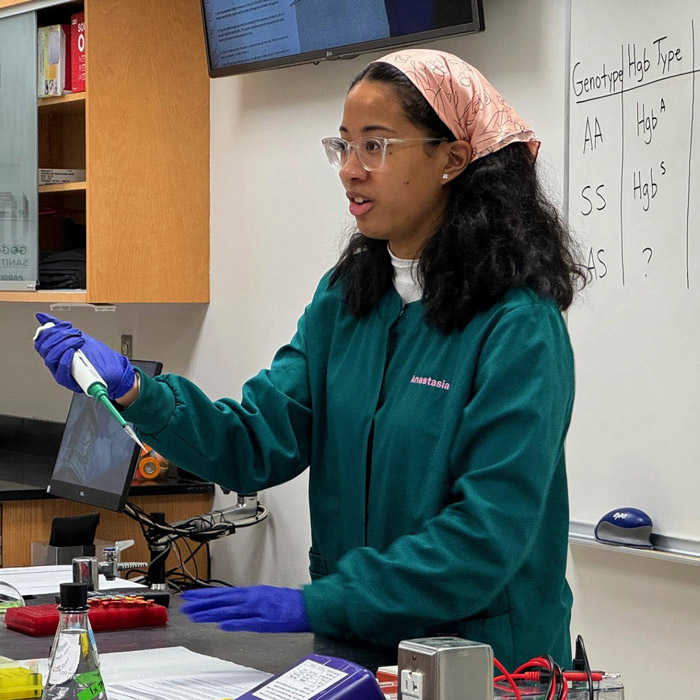
Visit Us at SciTech!
Learn more about making us your next field trip destination.
Find Out MoreThe Maryland Loaner Lab (MDLL) high school kits are specifically designed to support the Next Generation Science Standards (NGSS). We currently offer ten different kits for students in grades 9–12.
Interested in borrowing a Maryland Loaner Lab kit? Start by choosing a kit from our catalog and submitting a reservation request. We’ll ship the kit to you free of charge. You and your students can use it in your classroom for 14 days. When you're done, simply return the kit using the pre-paid FedEx shipping label included in the box.
Teachers are eligible to borrow kits after they have attended a one-time Maryland Loaner Lab training session. Once eligible, kits are free and scheduled on a first-come, first-served basis.
Our kits include a teacher's manual that provides set-up instructions, student worksheets, return shipping instructions and labels, and a return equipment checklist. Each kit is described in the table below.
Kits contain enough materials to serve all of your students, including over multiple class periods. Your kit will include enough equipment (such as micropipettes) to accommodate one class period at a time, with enough reagents (such as DNA samples) to serve your total number of students.
Reserve a kit using the online Maryland Loaner Lab Request form (see sidebar). Kits are on-loan for 14 days. Kits are for individual use and may not be shared with untrained teachers.
You received your kit, now what? Immediately put red cold bags in the refrigerator. Use the checklist to make sure you have all items listed. Also, check for any broken materials or equipment. Notify us at mdll AT_TOWSON immediately if there are any problems.
Time to return your kit? Clean and dry all equipment, then repack items neatly as received. Complete the return checklist and note any missing or broken items. Tape the box shut and attach both shipping labels (return address and FedEx tracking) as directed. Return shipping is free—schedule a FedEx pick-up using the provided instructions or drop off the kit at any FedEx location.
Below is a description of each of our MDLL high school kits, including links to teacher's manuals, PowerPoint's, and student handouts.
| MDLL Kit | description | teacher resources |
|---|---|---|
| Berries...with a side of DNA? (DNA Extraction) | Students explore the role and function of DNA in living organisms by extracting DNA from a fruit. | |
| Case of the Crown Jewels | Students use restriction enzyme analysis in this DNA fingerprinting lab to solve a fabricated crime. | |
| Chestnut Tree | Students explore biocontrols and genetic tags using restriction enzyme analysis. Additionally, students discover ecological concerns regarding introduced species and loss of species. | |
| Looking Backwards, Looking Forward | Students act as paleoclimatologists as they gather and interpret data to infer Maryland's climate over the past 12,500 years. | |
| Looking into Lactase | This enzyme lab is available in guided and structured inquiry formats. Students develop their own investigations to evaluate the effectiveness and limits of the enzyme lactase. | |
| Mystery Disease (Mystery of the Crooked Cell Guided Inquiry) | Using protein gel electrophoresis, students determine whether a patient carries the gene that causes sickle cell anemia. Designed for honors and AP level biology classes; meets some AP biology standards. | |
| Mystery of the Crooked Cell Structured Inquiry | Using protein gel electrophoresis, students determine whether a patient carries the gene that causes sickle cell anemia. | |
| Mystery Tubes | This black box activity allows students to explore the nature of science as they work to figure out how the mystery tubes are constructed. | |
| Ocean Acidification | Students answer the driving question "How might increasing levels of CO2 affect oysters in Maryland?" by planning and carrying out an investigation and using models. | |
| Wildlife Forensics | Students explore a marine conservation issue, conservation management, and PCR. They use gel electrophoresis to gather evidence in a real life CSI case. |
Introducing the newest member of the Maryland Loaner Lab family! MDLL Minis are short classroom activities that focus on building students' lab skills.
| MDLL Kit | description | teacher resources |
|---|---|---|
| Roy Gee Biv Micropipette Challenge | Students practice proper micropipetting technique in this fun and colorful challenge! |
Please let us know in advance if you need to cancel your reserved kit by emailing us at mdll@towson.edu. Early cancellation will help us give other teachers the opportunity to book a kit.
Email us at mdll AT_TOWSON.